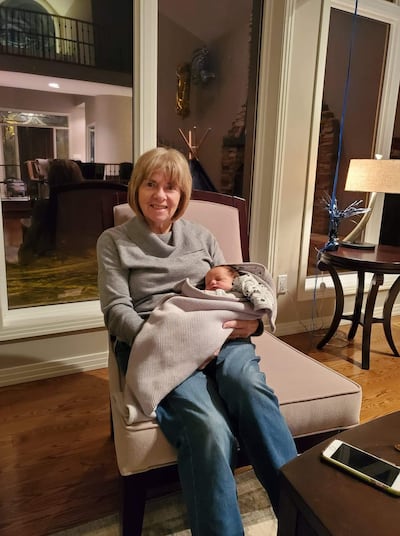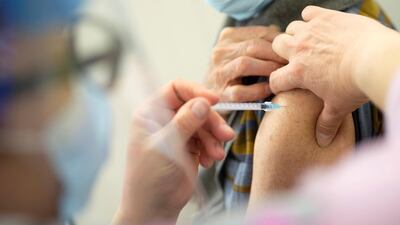Debby Fullerton hasn’t seen her grandson since he was three weeks old.
The 69-year-old grandmother lives in a small town in New Brunswick, Canada. She has been cut off from her daughter and grandson Noah, who is now 14 months old, since the start of the pandemic.
“I try not to focus on it too much because I get so sad,” said Ms Fullerton. “Video chatting has been a lifesaver. But again, it’s still not like being there in person.”
She was hoping that she would be vaccinated by now and able to travel to see her family, who live 4,500 kilometres away in Edmonton, Alberta. But Canada's vaccination programme has got off to a slow start.

In a country of 37.5 million people, just over 1.9 million doses have been distributed so far. That is only slightly more than the number of people the US is vaccinating per day.
“I feel desperate. When are we going to get it?” Ms Fullerton asked.
With just 3.6 per cent of the population having received at least one dose of the vaccine, Prime Minister Justin Trudeau has promised that every Canadian who wants the vaccine will have access to it by September.
However, many across the country are not convinced that will be possible.
Experts blame the delay on the lack of production facilities.
“We have been beholden to pharmaceutical companies in other countries for some of our basic health goods,” said Dr Jillian Kohler, a professor in the Leslie Dan Faculty of Pharmacy, Dalla Lana School of Public Health & Munk School of Global Affairs & Public Policy at the University of Toronto, whose research focuses on fair access to essential medicines.
She described Canada's vaccination campaign so far as a “disaster".
Without domestic production capabilities, Canada has had to look elsewhere for vaccines.
The government has ordered more doses per capita than any other country in the world. So far, it has spent about $800m to secure access to 400m doses of the vaccine. That is enough to fully inoculate the entire country 5 times over.
Where are all the doses?
While the orders have been placed, the country has not received most of the drugs, and Canadians are beginning to question the fine print of some of the deals that Canada has signed.
“The government was a little bit sloppy in terms of its deals. We made deals with suppliers that would have led to an enormous amount of supplies for Canadians. It might still, but the devil is in the details,” said Dr Kohler.
“So, we were getting vaccines on a quarterly basis versus on a monthly basis, which has led to slowdowns.”
Canada made deals with seven different manufacturers in an attempt to spread out its supply to avoid the very problems it is currently experiencing. Out of fear that the US would not allow any export of the vaccine, Canada looked across the Atlantic to the EU.
In February, European companies struggled with production, severely limiting the number of doses Canada received.
The country has turned to Covax, a World Health Organisation initiative designed to help improve global access to vaccines. Canada is the only Group of Seven nation to turn to Covax for help.
Prime minister’s popularity plunging
And Mr Trudeau’s popularity has begun to take a hit.
Rhoda Kopstein, 94, has been a lifelong Liberal Party supporter. But the government has done such a poor job with the vaccine programme that she feels betrayed.
"This is either stupidity, incompetence or a lack of political moxie, and I think all three are true," Ms Kopstein told The National.
Dr Kohler believes it goes further than that. “I would say it was negligent [for the government] to not act on critical areas that it should have and that to me shows a thoughtless government, a government that doesn't have the know-how to deal with a crisis like Covid-19,” she said.
Both federal and provincial governments are now trying to make up for their initial failures.
Mr Trudeau has announced plans to open a facility in Montreal that will produce the Novavax vaccine, but production will not start until the end of the year.
On Friday, the federal government approved the AstraZeneca vaccine, hoping to speed up vaccine deliveries.
Ontario, the province with the largest population, has announced it will begin distributing vaccines to residents aged 80 and above on March 15.
That’s good news for Ms Kopstein. The retired social worker has a long list of activities she is looking forward to doing once she receives both doses.
“What I’d like to do is go to the bookstore. I haven't been to the bookstore in a long time,” said Ms Kopstein. “I would also like to be able to go back to the bridge group and play bridge with my friends. I’d really like to go back and do my own shopping. And top of the list, my number one priority is I’d really like to have a haircut.”
While the end is in sight for Ms Kopstein, Ms Fullerton believes she is still months away from being inoculated.
"If the vaccines keep coming in the way they are coming, the earliest I would get it would be July."
That means her grandson Noah will be 18 months old before she can hold him again.
It is a thought she tries to push away, digging deep into her well of patience, like so many other Canadians, hoping it doesn't dry up before she receives her vaccine.
“There is not a lot we can do to get the vaccine coming in faster. Now it's just having a lot of patience, which is all you can do.”


